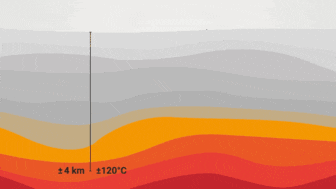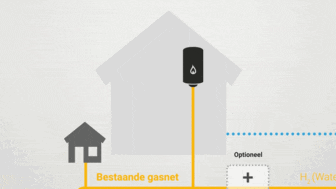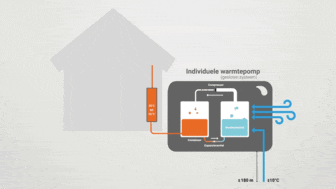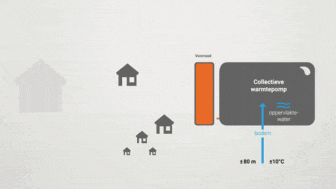Why smart heating?
The whole of the Netherlands must get rid of natural gas by 2050, so that we no longer emit CO₂. On Ameland we want to have that job completed by 2035.

How?
We will do this together! The municipality has the legal task of organizing the transition to natural gas-free. Owners of homes and buildings can take energy-saving measures themselves, which are always beneficial.
Step-by-step
View the steps below to see how we will realize natural gas-free homes and other buildings together.

Reduce heat demand
Insulation and other energy saving measures. In this way we make homes and villages more energy efficient. See what you can do yourself >>

Lower boiler temperature
By improving the insulation, you prepare your home for the lower temperatures associated with sustainable heating methods. Is your house not ready for that yet? Then go back to step 1.

Choose a sustainable heat source
In the future we will all switch to a sustainable heat source. These can be individual (in your home) or collective (shared) heat sources.
What suits Ameland best? Based on current knowledge, the following four possible alternatives to natural gas are investigated. Watch the animations to better understand what the options entail and what they mean for you and your home.
 View animation
Hydrogen in gas pipeline
With deep geothermal energy as a source
View animation
Hydrogen in gas pipeline
With deep geothermal energy as a source
 View animation
Electrification with heat pump
With the outside light or soil as a source
individual
View animation
Electrification with heat pump
With the outside light or soil as a source
individual
 View animation
Electrification with heat pump
With soil or surface water as a source
collective
View animation
Electrification with heat pump
With soil or surface water as a source
collective
 View animation
View animation
Watch this animation to see how and why we are switching to sustainable energy.
Process
Some natural gas alternatives are large-scale and collective, such as heating networks or geothermal energy. The city council must ultimately make a decision on this. See the timeline below for more information about the process.
- 2023
Village conversations Feb/Mar 2023
During the first four discussion evenings, in February and March 2023, a total of approximately 125 Amelanders came together to exchange ideas about sustainable heat for their home.
Village interview 12/12/2023
Following the village discussions at the beginning of 2023, the municipality of Ameland is organizing a new round of discussion evenings. On 12/12 the technology of ‘Geothermal’ is central.- 2024
Village discussions in early 2024
At the beginning of 2024, the municipality of Ameland will continue village discussions about the technical possibilities
Advice to the municipal council
The input and insights arising from the village discussions ultimately lead to advice to the Ameland municipal council. This is expected to be in the course of 2024.- 2035
Natural gas-free Ameland
On Ameland we want to switch to natural gas-free heating by 2035. In this way we fulfill our Amelander ambition to be at the forefront of the energy transition for fifteen years. As an island we will then be independent of fossil fuels, we will emit almost no CO² and we can largely meet our own heating needs.
Projects
-
2025
 SHINES - Turning tidal and rivers into tomorrow's energy
SHINES - Turning tidal and rivers into tomorrow's energy -
2024
 NESSIE
NESSIE -
2023
 Energy park Ballumerbocht
Energy park Ballumerbocht -
2023
 Making recreational homes more sustainable
Making recreational homes more sustainable -
2023
 P1 Meter
P1 Meter -
2023
 Smart heating of Ameland
Smart heating of Ameland -
2023
 Sufficient network capacity
Sufficient network capacity -
2022
 Test with fuel cell on hydrogen gas
Test with fuel cell on hydrogen gas







